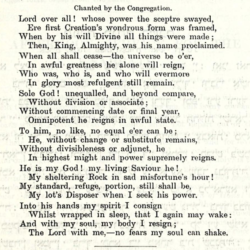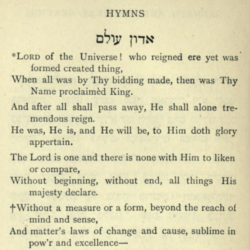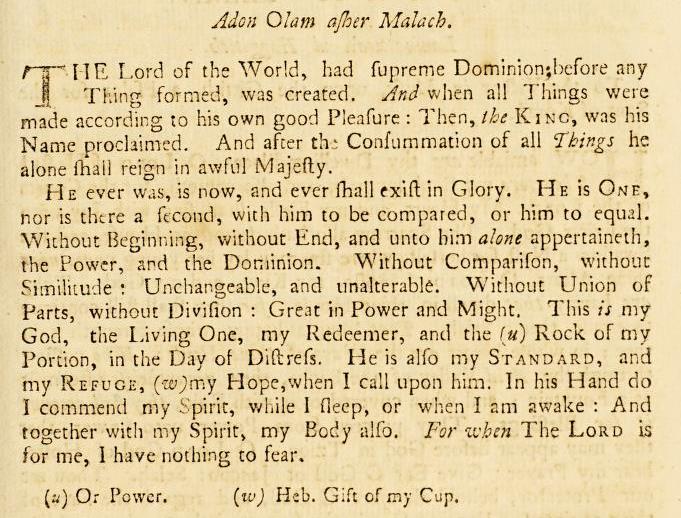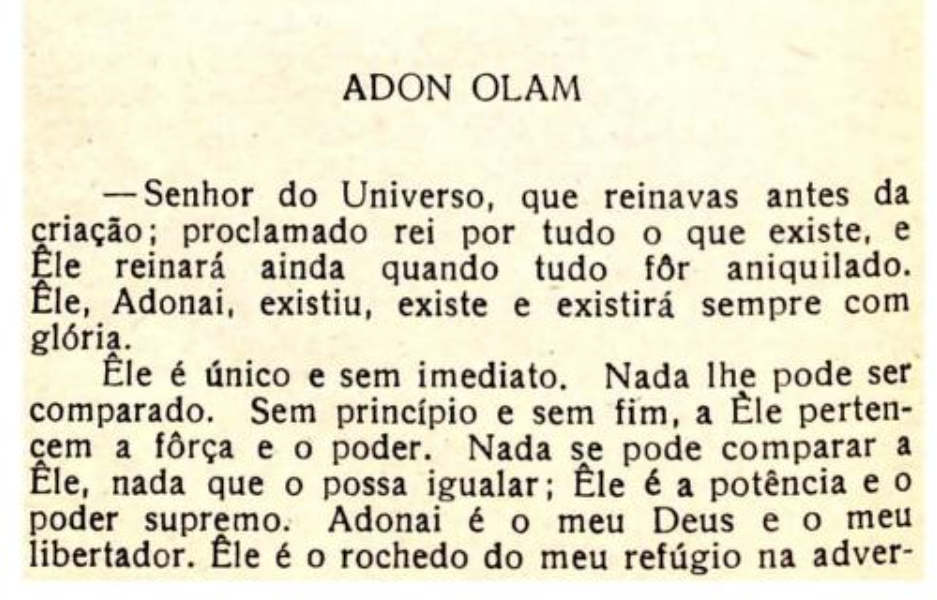TOGGLE COLUMNS (on/off):ADJUST COLUMN POSITIONS: select the column header cell and drag it where you want. show me!COPY INDIVIDUAL COLUMN(S): use CopyTables, a browser extension.
| Source (Hebrew) | Translation (English) |
|---|---|
אֲדוֹן עוֹלָם אֲשֶׁר מָלַךְ בְּטֶֽרֶם כׇּל־יְצִיר נִבְרָא׃ לְעֵת נַֽעֲשָׂה כְּחֶפְצוֹ כֹּל אֲזַי מֶֽלֶךְ שְׁמוֹ נִקְרָא׃ |
Creation’s Lord! He ruled from aye Ere yet created form was made. What time He willed this world to be, Then homage to His rule was paid. |
וְאַֽחֲרֵי כִּכְלּוֹת הַכֹּל לְבַדּוֹ יִמְלֹךְ נוֹרָא׃ וְהוּא הָיָה וְהוּא הֹוֶה וְהוּא יִֽהְיֶה בְּתִפְאֲרָה׃ |
And when all things shall cease to be, Alone His awe shall be displayed. He was. He is. He e’er shall be In glory that can never fade. |
וְהוּא אֶחָד וְאֵין שֵׁנִי לְהַמְשִׁיל לוֹ לְהַחְבִּירָה׃ בְּלִי רֵאשִׁית בְּלִי תַּכְלִית וְלוֹ הָעֹז וְהַמִּשְׂרָה׃ |
Unique, alone, without compare Is He by whom all else was made. Without beginning, without end; His might. His rule, must be obeyed. |
בְּלִי עֵֽרֶךְ בְּלִי דִמְיוֹן בְּלִי שִׁנּוּי וְהַתְּמוּרָה׃ בְּלִי חִבּוּר בְּלִי פֵרוּד גְּדׇל־כֹּחַ וְהַגְּבוּרָה׃ |
Without compare, unchanging He Whose thoughts infinity pervade. Without associate, complete, In might supreme He is arrayed. |
וְהוּא אֵלִי וְחַי גּֽוֹאֲלִי וְצוּר חֶבְלִי בְּיוֹם צָרָה׃ וְהוּא נִסִּי וּמָנוֹס לִי מְנָת כּוֹסִי בְּיוֹם אֶקְרָא׃ |
He is my God, my living hope In troubled hour, my rock, my aid, My banner, refuge, portion true, My guide to whom my prayer is prayed. |
בְּיָדוֹ אַפְקִיד רוּחִי בְּעֵת אִישַׁן וְאָעִֽירָה׃ וְעִם רוּחִי גְּוִיָּתִי אֲדֹנָי לִי וְלֹא אִירָא׃ |
I rest my spirit in His hand; Asleep, awake, by Him I’m stayed. My body and my soul with God, I face my future unafraid. |
Adon Olam is a piyyut that became popular in the 15th century and is often attributed to Solomon ibn Gabirol (1021–1058) and less often to Sherira Gaon (900-1001), or his son, Hai ben Sherira Gaon (939-1038). The variation of the piyyut appearing here is the 12 line version familiar to Sepharadi congregations. (There are also fifteen and sixteen line variants found in Sepharadi siddurim. The Ashkenazi version has ten lines.) The translation appearing here was transcribed from Rabbi David de Sola Pool’s Tefilot l’Rosh haShanah (1937).
Source(s)


“אֲדוֹן עוֹלָם (מנהג הספרדים) | Adōn Olam, rhyming translation by Rabbi David de Sola Pool (1937)” is shared through the Open Siddur Project with a Creative Commons Public Domain Dedication 1.0 Universal license.









Comments, Corrections, and Queries